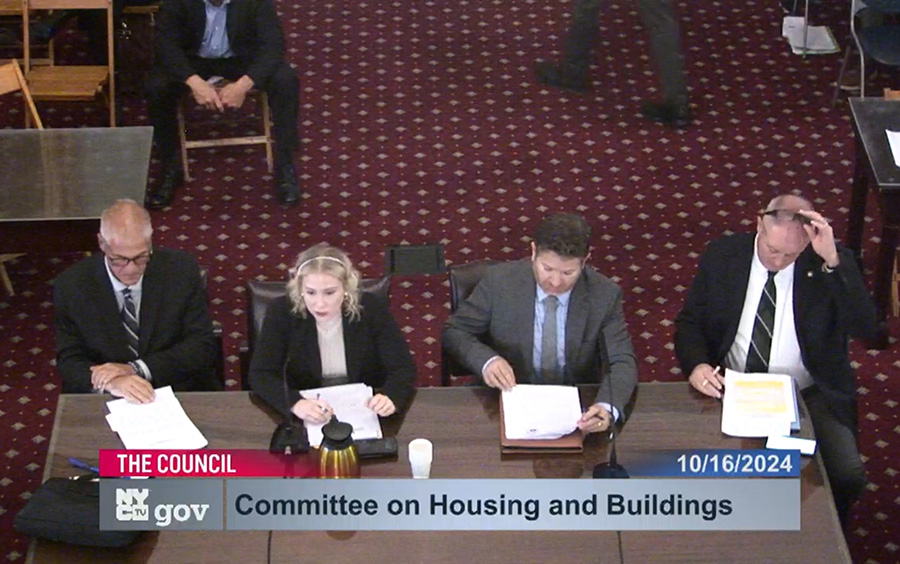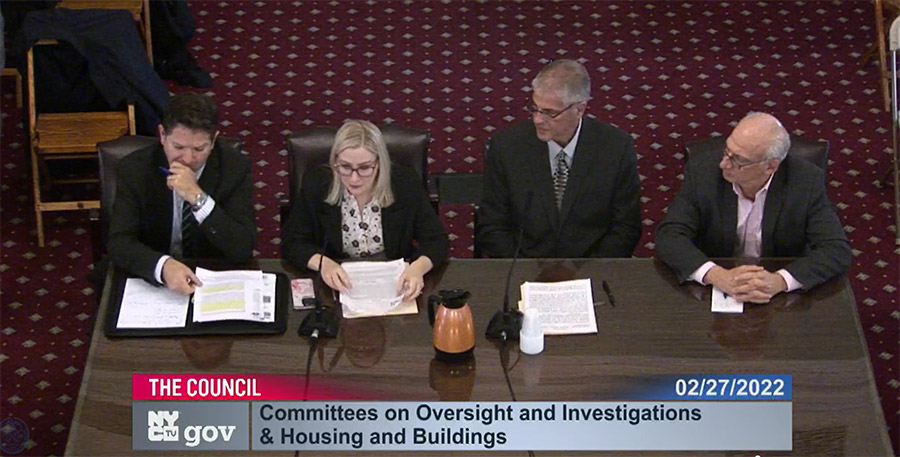On Wednesday, October 16, 2024, the New York City Council Committee on Housing & Buildings held a hearing on several bills, but specifically in the interest of the Plumbing Foundation was Int. 429-2024. Int. 429 contains several vital amendments to Local Law 152/2016 periodic gas inspections as well as to ordinary plumbing work, emergency work, and the NYC Department of Buildings’ (DOB) seizure and forfeiture ability related to unlicensed construction activity. The bill also proposes to reinstate the Master Plumber and Master Fire Suppression License Board.

L to R: George Bassolino, Master Plumbers Council; April McIver, Executive Director, Plumbing Foundation; Terence O’Brien, Senior Director, Plumbing Foundation; John Sullivan, Full Time Trade Instructor, UA Local Union No. 1 Plumbers and Gas-Fitters Training Center
The hearing testimony began with the DOB, represented by Constadino ‘Gus’ Sirakis, Deputy Commissioner of Development & Technical Affairs and Tarek Khalil, Assistant Commissioner for Central Inspections. Unfortunately, despite industry feedback and perceived support from DOB on the Local Law 152 amendments, the Department testified against the legislation’s provisions for various reasons.
The Plumbing Foundation Executive Director April McIver testified in support of Int. 429, with a focus on the amendments to Local Law 152 (LL152). She used her time to correct several apparent misapprehensions made during the Department’s testimony. First, she explained that the proposed amendments seek to clarify and streamline the process for owners to obtain certification of no gas piping or if their building has gas piping, certification it is not being supplied with gas. The process to require a utility letter is not a procedure the utility companies want or believe they should do, rendering the law impracticable. Licensed Master Plumbers (LMP) are in the best position and best qualified to certify gas supply/piping status. Second, she agreed with the Chairwoman and sponsor of the bill, Pierina Sanchez, that given the 5 years’ of experience required by DOB rule for LL152 inspections that instating in law that a DOB journeyman plumber card is required, which is obtained by someone with 5 years of experience, makes the most sense. Currently, DOB is doing nothing to check the qualifications of and/or required training for technicians working under a licensed master plumber and conducting LL152 inspections. The Plumbing Foundation is aware of bad actors in the industry not complying with the qualification requirements (and has made DOB aware numerous times over the past few years). Ms. McIver also clarified that the amendments to the bill were NOT expanding the scope of an inspection into residential tenant spaces. Rather, the bill clarifies the original intent of the law to ensure commercial tenants like restaurants, daycare, and those otherwise open to the public are included in the scope of the inspection. Finally, Ms. McIver said in response to DOB’s comment that the Code Revision process is to address these types of amendments, while she is grateful to be included in that process, DOB has the ultimate say as to final language and the process is lengthy. The Local Law 152 second cycle begins in January 2025, so she urged the Council to act now.
Next, Terence O’Brien, the Senior Director of the Plumbing Foundation and the Executive Vice President of the Association of Contracting Plumbers (ACP) of the City of New York spoke in support of Int. 429, with an emphasis on the reinstatement of the Master Plumber and Master Fire Suppression Contractor Licensing Board and the expansion to DOB’s seizure and forfeiture abilities of tools and vehicles in connection with unlicensed construction. First, Mr. O’Brien explained that re-establishing the License Board is a necessity and that it was a travesty that the City decided to abolish the Board at the end of 2022. There are two functions of the Board: reviewing applications of potential new license holders and, more importantly, the review of disciplinary matters of existing plumbing and fire suppression licensees. Plumbing and Fire Suppression are highly regulated trades and peer review is a value to the industry, not a negative. He explained that NYS engineers, doctors, lawyers, and many others all have peer review which aids in regulating their professions. The industry has received no valid explanation as to why the City disbanded the Board. Secondly, Mr. O’Brien explained that the DOB has been supportive of the proposal to expand the Department’s ability to seize tools and vehicles of persons/companies engaging in illegal and unlicensed construction in the City. Currently, the Code only allows for such seizure in connection with residential new construction. There are countless persons and even whole companies actually conducting plumbing work without a license and thereby have no ability to obtain permits to legally perform that work. These unlicensed plumbers are performing work in residential and commercial buildings of all sizes and jeopardizing public health and safety. Currently, DOB and Courts can only do what they are legally allowed to do against these unlicensed actors: a small monetary fine of a few thousand dollars which is regularly not collected. Mr. O’Brien emphasized that having the ability to impound the vehicles and tools of unlicensed plumbers is truly the only way to stop this pervasive and growing problem.
Both Ms. McIver and Mr. O’Brien submitted written testimony in support of the entirety of Int. 429. Thank you to Chairwoman Pierina Sanchez for sponsorship of the bill and for providing an opportunity to testify on this important piece of legislation. We hope to work with both the Council and DOB in the near future to get this legislation passed into law.

